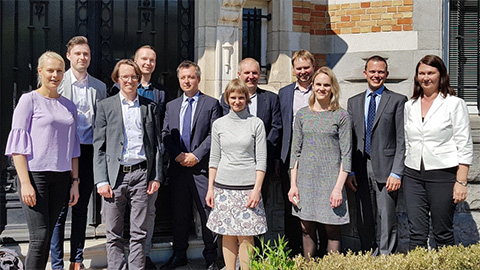New Research Project Brings Together Producers and Users of Knowledge for the Development of Growth Corridors
The new multidisciplinary research project of the University of Turku, which focuses on the utilisation of big data in territorial policy development, is part of the ESPON research programme. The project is coordinated by the Centre for Collaborative Research of the School of Economics.

The kick off meeting of the project was organised on 7–8 May in Brussels at the office of the Council of Southwest Finland. In the picture from the left: Liis Vahter, Dino Keljalic, Nicolas Balcom Raleigh, Pekko Lindblom, Nicolas Rossignol, Siiri Silm, Jukka Heikkonen, Antti Vasanen, Helka Kalliomäki, Laurent Frideres and Ira Ahokas.
A new multidisciplinary project related to the utilisation of big data started in the University of Turku in May 2018. The project unites researchers and regional stakeholders from the beginning of the project to collaborate for the better usability of research in the practical policy making processes. The Potentials of Big Data for Integrated Territorial Policy Development in the European Growth Corridors (Big data & EGC) project aims at enhancing the use of big data in territorial planning and policy making, especially in the context of transportation corridors crossing national and regional borders. The project is part of the ESPON (European Territorial Observatory Network) research programme funded by the EU.
– The development of these corridors has for long leaned on statistical data based on diverse administrative units, which does not enable the examination of increasing interregional and international interactions along the corridors. The actors involved in territorial policy making at different administrative scales have a concrete need to understand the potentials related to the utilisation of big data, and to increase their skills in utilising new datasets. For researchers, it is important to explore the possibilities and restrictions related to new datasets and their analysis, says the project’s Principal Investigator Helka Kalliomäki from the Centre for Collaborative Research of the School of Economics.
The project also includes researchers from the Finland’s Futures Research Centre and the Department of Future Technologies. In addition, the researchers from the University of Tartu’s Mobility Lab are part of the research consortium.
From the user side, the Regional Council of Southwest Finland represents the lead stakeholder. Other stakeholders are the Council of Örebro from Sweden and the Ministry of Economic Affairs and Communications from Estonia. Furthermore, experts from the ESPON programme participate regularly in the project meetings to enhance the realisation of the programme-level objectives.
Close Collaboration Increases Research Impact
The ESPON research programme has been running since 2002 to improve the knowledge-base of territorial policy making in Europe and to support the collaboration between European regions in territorial development. The programme aims at producing new comparable knowledge about territorial development dynamics, and supporting the knowledge transfer and policy learning between the regions.
The collaboration of regions and researchers is supported through various networking activities. In addition to applied thematic research project, a speciality of the programme are the so-called Targeted analysis projects, in which regional stakeholders propose a topic for the ESPON coordination unit based on their own needs and challenges in territorial development.
– Research setting based on regional needs and close collaboration between the stakeholders and the research group represents today’s way of doing research aiming at increased societal impact. The objective of our unit is to promote exactly this kind of collaborative research that is both of a high scientific quality and takes into account the needs of the users, says Helka Kalliomäki.
TS
Photo: Martti von Wright